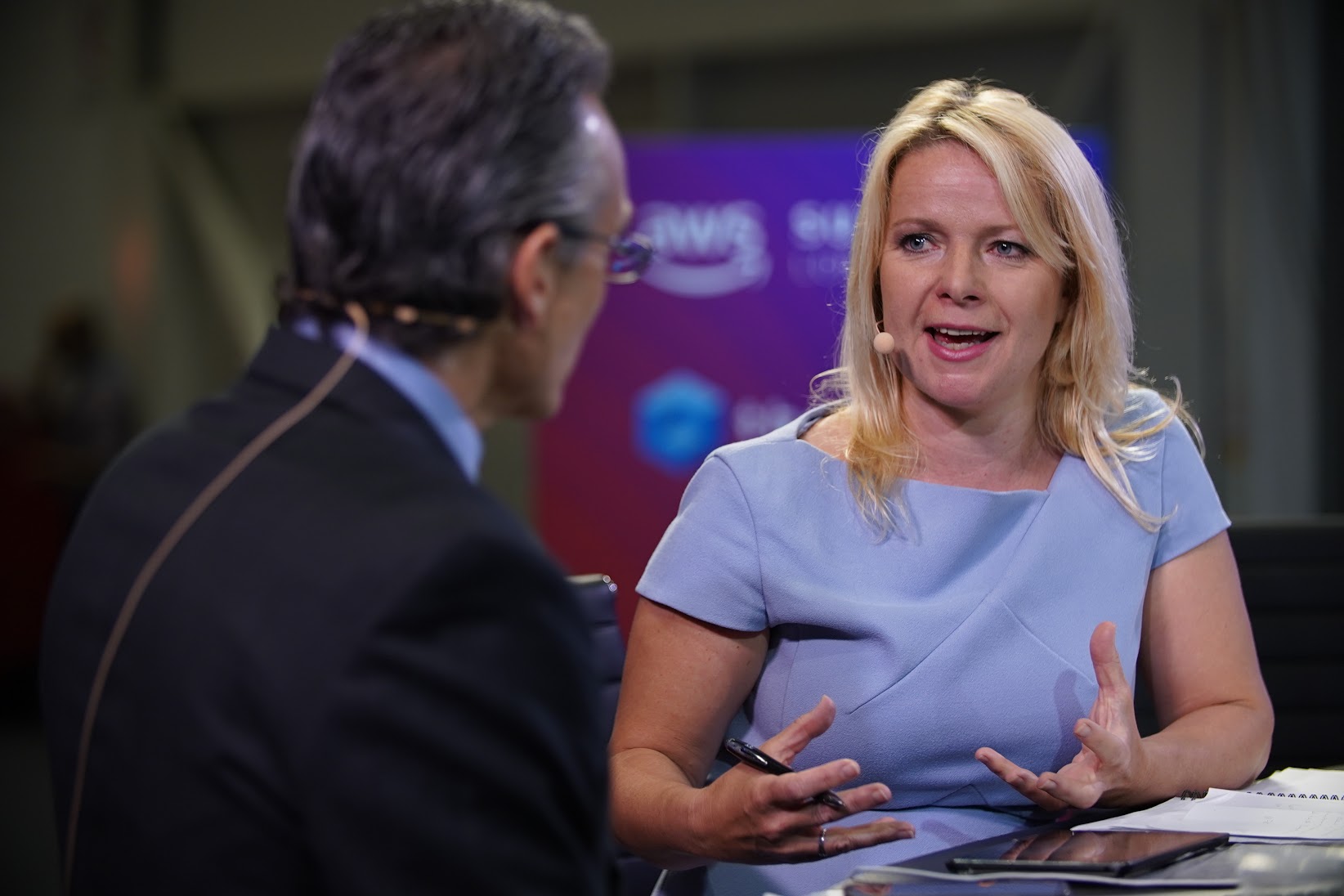 CLOUD
CLOUD
 CLOUD
CLOUD
 CLOUD
CLOUD
With upwards of 12,000 attendees for AWS Summit’s one-day event in London, it’s hard to imagine that nearly 15 years ago Amazon Web Services Inc. was so little regarded as a true player in the public cloud market.
“AWS announced its first service in 2006, very quietly announcing EC2, a compute service nobody really paid much attention to,” said Dave Vellante (@dvellante), chief analyst at The Wikibon Project and cofounder and co-chief executive officer of SiliconANGLE Media. “But AWS has permanently changed the landscape of the technology business. We’re here in London with 12,000 people at a one-day summit. I mean, that’s as large as many U.S.-based three-day conferences.”
Vellante appeared with Susannah Streeter (@StreeterNews), co-host of theCUBE, SiliconANGLE Media’s roving news desk. The duo discussed the highlights of the keynote presentation from AWS Summit London and how AWS is playing out a strategy, with partners who sometimes double as rivals, to stay on top of the public cloud game (see the full interview with transcript here). (* Disclosure below.)
Referring to its thousands of attendees as “builders,” this week’s AWS Summit keynote made a special appeal to its United Kingdom audience by highlighting the national spirit of invention. Commemorating several firsts that happened in the U.K., from The Savoy Theatre’s use of electric lights to the Colossus code breakers, AWS hopes to connect with attendees on the idea of constant reinvention, supporting these “builders” with regional data centers for high availability and a string of local failsafes.
“AWS talks about its differentiation with the number of regions it has around the world. I believe they said they have 21 regions, 64 availability zones, which are little, mini regions inside the regions in case there’s a problem you can fail over, and 14 database services,” Vellante stated. This global investment in computing infrastructure is one way AWS stays ahead of the curve, enabling the cloud platform giant to move faster than competitors and roll out more services.
“AWS has gotten a head start and is learning from current customers and those it’s had in the past to find out what new services they want. So it has this wealth of data to build on. It seems every month AWS is another step ahead,” Streeter said.
This data is critical for Amazon at large, currently in a dog fight with Google, Microsoft and Oracle for ownership of the modern economy’s most valuable resource, according to Vellante. “People talk about data being the new oil, but [Wikibon] thinks data is more valuable than oil. You can put oil in a car or in a house, but you can’t put it in both. Data is reusable in a way we’ve never seen before with natural resources,” Vellante said.
Once machine intelligence is applied, AWS becomes a powerhouse in determining and deploying the products and services its “builders” want and need. “AWS knows that if it can get your data in the cloud and do so cost effectively, and deliver services that delight you, it has a perpetual business model,” Vellante said.
That strategy is working well for AWS, which boasts a $30 billion run rate and growing at a constant currency rate of 42% per year. While Microsoft’s annual growth rate is higher than AWS’, Vellante pointed out the much smaller base for Microsoft’s market share.
“Even more importantly, AWS’ operating income is phenomenal. AWS is only 12% of Amazon revenue but accounts for 50% of its operating income,” said Vellante, noting its status over the very profitable Cisco and even EMC when it was a publicly traded company. “The only companies more profitable on a percentage basis than Amazon are pure play software companies, like an Oracle. So Amazon, who’s an infrastructure company, is as profitable almost as a software company. It’s astounding,” Vellante said.
Yet, success can breed contempt. Though AWS has attracted some notable customers, including mega retailer The Sainsbury’s Group and the U.K.’s Ministry of Defense, in many regards retailers are rivals of Amazon, and AWS’ growing portfolio of government contracts is garnering legal action from legacy technology companies.
Joining AWS executives on stage during the Summit’s keynote, Sainsbury’s disclosed that they use some 80-odd AWS services. “It’s almost like a pick-and-mix sweet shop, or as you’d say, a candy store,” Streeter said. “That’s some of the benefits customers view for AWS.”
Yet the decision to join the enemy can be tough for retailers, according to Vellante. “Sainsbury’s said, ‘OK, we can compete — we have a unique advantage with Amazon retail.’ But it’s something worth watching for sure, because Walmart obviously doesn’t want to run in the AWS cloud because it’s fearful. At the same time, Amazon would tell you there’s a brick wall between AWS and the retail side … so it’s just a matter of that tradeoff. Is the risk of running in AWS and potentially running at a competitor site worth the extra value you get out of the services? That’s what the market has to decide,” Vellante concluded.
Below is the complete video analysis, part of SiliconANGLE’s and theCUBE’s extensive coverage of AWS Summit London this week. (* Disclosure: TheCUBE is a paid media partner for the AWS Summit London 2019 event. Neither Amazon Web Services Inc., the sponsor for theCUBE’s event coverage, nor other sponsors have editorial control over content on theCUBE or SiliconANGLE.)
THANK YOU